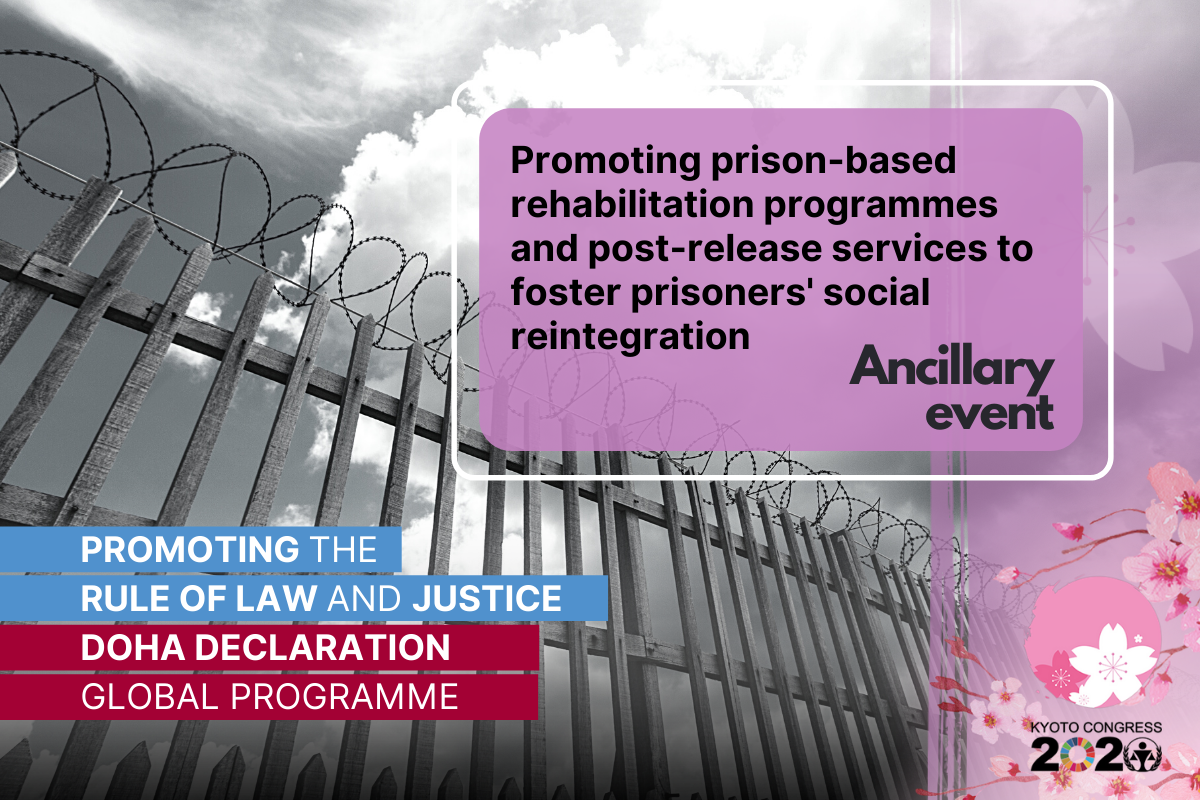With metalwork and woodwork, UNODC supports prisoner rehabilitation in Tajikistan
05 November 2020 – In these times of global upheaval, some segments of society can be forgotten as big stories compete for attention. Improving the lives of every member of the community remains the priority for UNODC at all times when it comes to peace, justice and strong institutions, and that includes the circumstances of prisoners as they embark on skills training to provide them with a new chance in life.
This week in Tajikistan, UNODC’s Prisoner Rehabilitation initiative, part of the Global Programme for the Implementation of the Doha Declaration, marked another milestone in working with the Tajik authorities to improve prospects for the social reintegration of prisoners.
As part of its worldwide efforts in promoting the relevance of prisoner rehabilitation, the Global Programme has provided technical assistance geared at fostering the goals set under the 2015 Doha Declaration, which emphasizes the importance of promoting measures supporting the rehabilitation of prisoners and their social reintegration into the community.
“UNODC is committed to support Member States in establishing a more rehabilitative approach to prison management and investing into programmes for prisoners,” noted Ashita Mittal, UNODC Regional Representative for Central Asia. “We believe that when this is done well, it can be one of the best and most cost-effective ways of preventing prisoners from re-offending, with significant benefits not only for the individuals concerned, but also for public safety more broadly.”
To this end, UNODC has provided support in the development of a metalwork programme in Dushanbe and a woodwork programme in Khujand. These programmes fully comply with international standards and will serve to enhance prisoners’ earning capacity, thus improving their ability to better reintegrate into society. The modernized prison-based production facilities will enrol up to 200 male prisoners on an annual basis, giving them vocational courses and certificates qualifying them to work in metalworking and furniture manufacturing upon their release.
Ilhom Mahmudzoda, Deputy Head of the Main Directorate for the Execution of Criminal Sentences of the Ministry of Justice of the Republic of Tajikistan, spoke of the long-term contributions of UNODC in the region: “UNODC is one of the key partners of the prison service, and we have been working on a wide range of issues related to prison reform, including on social rehabilitation of prisoners, safety and security, capacity-building and that prison service stands ready to continue the excellent cooperation with UNODC.”
The Global Programme’s various initiatives are supported by generous funding from the State of Qatar. Welcoming the launch of these programmes, Ibrahim Mohamed Al-Abdulla, Ambassador of Qatar in Tajikistan, said: ““We consider investing in vocational training and capacity building programmes as one of the most important, successful and effective ways to reduce crime in society. Therefore our Government pays special attention to the coordination of efforts with the UN agencies in providing assistance to the beneficiaries. The vocational training centre we are opening today is strong evidence and a reflection of the fruitful cooperation between the State of Qatar, the Republic of Tajikistan and UNODC in providing training and helping inmates to acquire a profession so that they can make a positive contribution to the progress and safety in their communities.”
The rehabilitation programme caters for prisoners to be employed in these prison-based workshops, and to receive an equitable remuneration for their work; they will be allowed to use their salaries both for covering their own needs and to support their families. Equipping prisoners with formal qualifications and skills will also enhance the prisoners’ employment opportunities after they have served their sentence, a factor which can play a crucial role in reducing the likelihood of recidivism.
Marco Teixeira, Global Coordinator of UNODC’s Global Programme, elaborated on this point: “Prison, as part of the larger criminal justice system, plays a crucial role in maintaining safety for society. More importantly, it can contribute to creating a peaceful and inclusive society by upholding the rule of law through ensuring appropriate and rights-based treatment of prisoners and offering them opportunities for rehabilitation.”
As the guardian of the United Nations Standard Minimum Rules for the Treatment of Prisoners (the Nelson Mandela Rules) which recall the importance for penitentiary systems to include measures to foster prisoners’ social rehabilitation, UNODC supports Tajikistan in its efforts to ensure that prisons are administered in a safe and humane manner, respecting the human rights of those incarcerated.
Additional information


